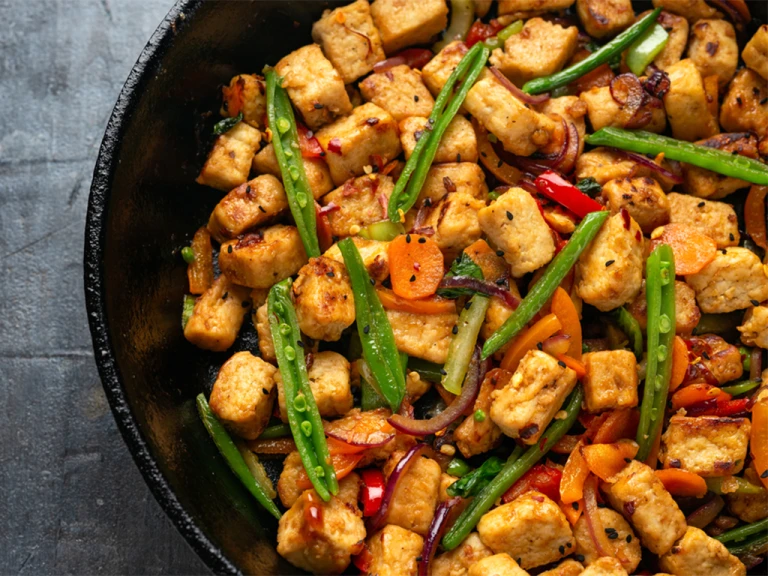
5 Delicious Protein Packed Meat Free Alternatives

For those who are living a meat-free lifestyle, there may be some concern about the lack of protein intake. However, we’re here to show you that a meat free or vegan diet can provide you with all the nutrients and protein you need!
For those who are living a meat-free lifestyle, there may be some concern about the lack of protein intake. However, we’re here to show you that a meat free or vegan diet can provide you with all the nutrients and protein you need! There are meat-free foods that contain significantly more protein than others. Protein is important in any diet, as it supports muscle growth, strength, satiety, and weight loss. Learn about different meat alternatives, ways to incorporate them into protein-packed meals, and their potential health benefits by reading on.
Quorn
Quorn® is a natural fungi based protein that contains a unique and nutritious protein known as Quorn's mycoprotein. An age-old fermentation process is used to grow Quorn's mycoprotein from a natural fungus that grows in the soil. What transpires is a versatile and protein-packed ingredient that is used in all Quorn products, from burgers to chicken nuggets. Quorn's mycoprotein is naturally high in protein, with 11g of protein per 100g. Through a combination of high fibre and high protein, Quorn's mycoprotein is able to help to regulate hunger and appetite, keeping you feeling fuller for longer. The benefits of Quorn's mycoprotein can be enjoyed in all Quorn food products, with ready-prepared meals available for ease and enjoyment.
You can also incorporate Quorn into traditional recipes, making healthy and delicious meals and snacks that will keep you energized and nurtured from within. Enjoy your own Quorn pieces grilled and served with colourful veggies and spices in a tortilla for zesty Mexican fajitas or tacos; or try a Quorn meat-free burger served with avocado, onion, peppers and greens served with a side of sweet potato chips as a meat-free, protein-packed spin on burger night.
Tofu
Before discarding tofu as plain and boring, you may want to hear out its benefits! Tofu is made of condensed soy milk that is pressed in a similar way as seen in cheesemaking. Tofu is high in protein and packed with nutritional benefits, containing all the essential amino acids your body needs to grow, regenerate, and function. With 8g of protein per 100g serve, tofu is a quick and versatile ingredient to increase your protein intake. While most of us are familiar with eating tofu browned in a frying pan, there are many more ways you can incorporate it into your favourite meals for a tasty, nutritious meal or snack. If you love burgers, you can use tofu as a meat-free pattie grilled in spices and served up on a bun with pickled slaw. You can also enjoy tofu in a high-protein smoothie! Simply add it with your usual smoothie ingredients and top with chia seeds, goji berries or pumpkin seeds for extra protein and nutrition.
Tempeh
Similar to tofu, tempeh is a nutrient-dense ingredient made from fermented soya beans. It’s also a fantastic meat-alternative to get your daily protein intake - with around 19g of protein per 100g! Tempeh contains B vitamins the body needs to help break down and get energy from our food. It also contains a good selection of minerals as well as calcium for healthy teeth & bones, magnesium and phosphorus (also great for bone strength), and zinc to act as a natural anti-inflammatory. Ideally, you want to eat tempeh on its own for full nutritional benefit. Luckily, there are many ways to incorporate it into meals as an added protein boost. Try a 30-minute tempeh stirfry for a delicious protein-filled meal at dinnertime.
Portobello mushroom
Known as natural cancer-fighters and immunity boosters, portobello mushrooms are not only healthy but are a great protein alternative for plant-based diets. These mature, white button mushrooms are 20% protein and also contain powerful antioxidants known to help lower cancer risk, fight diseases, and provide vitamins to help with energy, brain health, metabolism, blood pressure and more. Like most mushrooms, portobellos are a good source of amino acids - the building blocks of proteins. Enjoy the taste and benefits of portobellos by marinating them in infused oil before grilling and serving as a side. You can also stuff the mushroom caps with whole grains and herbs before roasting in an oven for a tasty meal time dish.
Lentils
These pebble-like dried seeds might not look like much but they sure do pack a protein punch! Similar to chickpeas, beans and peas, lentils are a unique source of complex carbohydrates, helping you to keep full and energized. Lentils are also a great source of plant-based protein, with 9g of protein per 100g. Another benefit of lentils is that they are packed with iron, which provides those on a plant-based or meat-free diet with the added iron levels needed to promote oxygen-carrying red blood cells in the body. Lentils can be incorporated as a meat-free alternative to dishes by tossing them cooked in a salad or even used to make lentil burger patties.
Embracing meat alternatives in your diet
Protein deficiency can be a concern for anyone embracing a meat-free meals, but it’s refreshing to know that you can get your protein intake from plant-based foods. This list demonstrates which meat alternatives contain the most protein and that can be easily incorporated into your daily meals.
Recent news
All news




